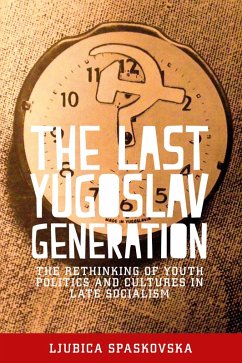
German Foreign Policy and the Outbreak of the Yugoslav War (eBook, ePUB)

PAYBACK Punkte
0 °P sammeln!
Seminar paper from the year 2001 in the subject Politics - International Politics - Topic: German Foreign Policy, grade: 1.0, Free University of Berlin (Otto-Suhr-Institut), language: English, abstract: In the summer of 1991, Yugoslavia was on fire. Two of the Yugoslav republics - Slovenia and Croatia - had held referendums on independence from Belgrade. In December 1990 and May 1991, the great majority in both states voted for independence. Since August 1991, Germany supported the recognition of Slovenia and Croatia actively. Finally, on the 23rd of December 1991, the German foreign minister ...
Seminar paper from the year 2001 in the subject Politics - International Politics - Topic: German Foreign Policy, grade: 1.0, Free University of Berlin (Otto-Suhr-Institut), language: English, abstract: In the summer of 1991, Yugoslavia was on fire. Two of the Yugoslav republics - Slovenia and Croatia - had held referendums on independence from Belgrade. In December 1990 and May 1991, the great majority in both states voted for independence. Since August 1991, Germany supported the recognition of Slovenia and Croatia actively. Finally, on the 23rd of December 1991, the German foreign minister Genscher announced Germany¿s recognition of Croatia and Slovenia as sovereign states. A long debate about what became known as "recognition policy" followed. Germany¿s unilateral recognition was widely criticized as the most profound mistake of German foreign policy since 1945 or - as Horsley put it - "a deadly sin of German foreign policy". The criticism not only came from the German political left, who accused the Kohl government of a retardation to a Bismarckian Machtpolitik. Even Germany¿s closest allies in Europe criticized Germany harshly. The French foreign minister Dumas warned Genscher that a unilateral recognition by Germany "will set Europe back twenty years". Uncertainties about Germany¿s future role in Europe may partly explain the critizism. France and Great Britain were unsure whether Germany would continue its policy of self-restraint or if it would implement a more unilateralist policy, especially towards its new neighbours in the east. Unsurprisingly, only one year after reunification, the question of recognition was perceived as a paradigmatic case of a "new German foreign policy". Was it the beginning of unilateralist power politics, a mere muscle play or just a diplomatic mistake? It has since become obvious that the unilateral recognition was not the beginning of a "new German foreign policy". Germany kept on the multilateral track. Today, more than a decade later, Germany is still a driving force behind the integration and enlargement of the EU. Nevertheless, the reasons why Germany acted the way it did, remain unclear. It is not difficult to understand the defection of Germany from multilateral cooperation in December - this is easily explained by a spiral of mistrust between Germany, France and Great Britain. [...]
Dieser Download kann aus rechtlichen Gründen nur mit Rechnungsadresse in A, B, BG, CY, CZ, D, DK, EW, E, FIN, F, GR, HR, H, IRL, I, LT, L, LR, M, NL, PL, P, R, S, SLO, SK ausgeliefert werden.













